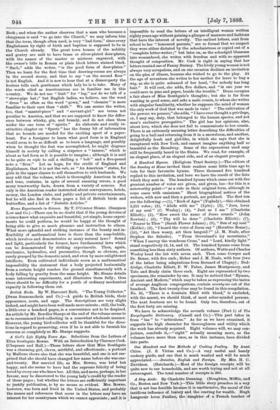A Girl's Life Eighty Years Ago. Selections from the Letters
of Eliza Southgate Bovine. With an Introduction by Clarence Cook. (Chapman and Hall.)—These letters show that Miss Southgate was a charming girl, clever, mirthful, and affectionate; a portrait by Malbone shows also that she was beautiful, and one is not sur- prised that she should have changed her name before she was one- and-twenty. Her married life, as Mrs. Bowne, was brief but happy, and she seems to have had the supreme felicity of being loved by every one who knew her. All this, and more, perhaps, in her favour, may be discovered to the young lady's credit by the reader of these pages ; but whether the letters are sufficiently important to justify publication, is by no means so evident. Mrs. Bowne, however, was born and lived in the United States, and probably the names and references that occur in the letters may have an interest for her countrymen which we cannot appreciate ; and it is impossible to read the letters of an intelligent woman written eighty years ago without gaining a glimpse of manners and fashions that have the interest of novelty. The earliest letters, sent from school to her "honoured parents," are so formal that we suspect they were either dictated by the schoolmistress or copied out of a "complete letter-writer;" but later on, as the schoolgirl blossoms into womanhood, she writes with freedom and with no apparent thought of composition. Mr. Cook is right in saying that her letters remind one of Fanny Burney. The lively young woman is not always very scrupulous, and on one occasion declines an invitation on the plea of illness, because she wished to go to the play. At the age of seventeen she writes to her mother for leave to buy a wig, as she is quite ashamed of her head, "for nobody has long hair." It will cost, she adds, five dollars, and "in one year we could save in pins and paper, beside the trouble." Dress occupies a fair share of Miss Southgate's thoughts ; but she is far from wanting in good sense, and asks a male cousin, to whom she writes with singular familiarity, whether he supposes the mind of woman the only work of God that was made in vain? "The cultivation of the powers we possess," she adds, "I have ever thought a privilege, or, I may say, duty, that belonged to the human species, and not man's exclusive prerogative." The girl has her opinions, also, about love, which she does not fail to communicate to her cousin. There is an extremely amusing letter describing the difficulties of going to a ball and returning from it in a snowstorm, and another, delightfully fresh and girl-like, in which she says that she is enraptured with New York, and cannot imagine anything half so beautiful as the Broadway. Some of the expressions used may still be frequently heard in the States. We read, for example, of an elegant place, of an elegant ride, and of an elegant prospect.


































 Previous page
Previous page